Ready for pollen season? How to deal with spring and summer allergies

Spring and summer may bring warm weather, but they also bring the infamous pollen and molds that prevent some people from enjoying the outdoors. Here are a few things to know about these seasonal allergies.
What are the most common spring and summer allergies?
Pollen and molds. Pollen is one of the most common allergies in the U.S., caused by a fine, powdery, airborne pollen powder from trees, grass, and weeds. People with pollen allergies only have symptoms when pollen is in the air. Mold allergies start in early June, but are usually worse when the weather is damp and when the leaves decay in the fall.
What are the symptoms of pollen and mold allergies?
- A runny nose with clear, thin nasal discharge
- Stuffy nose
- Sneezing
- Itchy nose, ears, eyes and mouth
- Red and watery eyes
- Swelling around the eyes
- Dry, scaly skin
How can I tell if I’m allergic to the plants in my yard?
If you are tested for allergies, we will tell you the specific trees and other plants you are allergic to. If you aren't sure what types of trees and plants are in your yard, there are several free, excellent plant identification apps that you can download to your smartphone. These include PlantSnap, LeafSnap or iNaturalist.
How can I protect myself and/or my child from these seasonal allergies?
During the pollen and mold season, we recommend jumping in the shower as soon as you get home every night to rinse the pollen off. Put cold, wet washcloths over your eyes and gently squeeze them to rinse the pollen out of your eyes. You may need to keep the air conditioner running through much of the season to keep the pollen out of the house. We never recommend staying indoors all summer, however! We encourage everyone to spend time outside playing as a family.
Should I take, or give my child, over-the-counter preventative allergy medication, even if I don’t know if I/they have allergies?
The over-the-counter allergy medications are both safe and effective. Steroid nose sprays, such as Flonase, Flonase Sensimist, Rhinocort, Nasonex and Nasacort, may help your nose and eye symptoms even if you don’t have allergies. The 24-hour antihistamines, such as Claritin, Clarinex, Allegra, Zyrtec and Xyzal, will also be helpful for your allergy symptoms. It is safe and effective to use a steroid nose spray and 24-hour antihistamine together. So, yes, even if you’re not sure, it is safe to give these medications a try to see if they will help. Finally, if your eyes won’t stop itching, try adding over the counter allergy eyedrops, such as Pataday, but avoid taking eyedrops that are marketed for red eyes, such as Visine which can make your eyes worse if used for a long time.
When is pollen season in Chicago?
In Chicago, the trees generally pollinate in March, April and May. The grass pollinates in May and June. The weeds pollinate from mid-August through the end of September.
What’s today’s pollen count?
Visit our University of Chicago Allergy and Immunology Facebook page for updates on the daily pollen count.
What time of day is the pollen count the highest?
Pollen counts are lowest before dawn, rise to their peak by mid-day and slowly fall in the evenings. On high pollen count days, there may still be higher-than-normal amounts pollen in the air in the evening. Weather also has a big impact on pollen counts. Dry, windy conditions increase the amount of pollen in the air, and rain lowers it.
If you’re allergic to pollen, what should you do on high pollen count days?
If you need to go outside, go in the morning rather than in the afternoon. Wear wraparound sunglasses and change clothes and shower when you get home. Keep windows closed and stay indoors during peak afternoon pollen times.
Do patients come to you with common misconceptions about allergies?
The most common misconception we hear is that someone who is allergic to cats or dogs can have a “hypoallergenic” pet. Unfortunately, there is no such thing as a hypoallergenic dog or cat. There’s also no such thing as a hypoallergenic human – our pets can become allergic to us! We do understand how important pets are to families and work on interventions that can keep the family and pets together whenever possible.
At what point should I see a doctor if I suspect I suffer from seasonal allergies?
We recommend seeking the care of an allergist when the over-the-counter medications are not giving you the relief that you need.
What types of services for diagnosing and treating allergies can I find?
If you see an allergist at UChicago Medicine, we may recommend either skin or blood tests to diagnose your allergies. Depending on the results, we will work with you to develop a treatment plan that may involve medications or immunotherapy (i.e., allergy shots).
Anything else people should know?
Although we are located inside Comer Children’s Hospital, the allergy team treats both children and adults with allergies. In fact, you can make an appointment together with your daughter or son if you'd like!

Christina Ciaccio, MD, MSc
Christina Ciaccio, MD, MSc, provides compassionate care for children and adults with food and environmental allergies, allergic rhinitis, urticaria and angioedema, allergic rashes and asthma. She strongly believes in educating patients and their families, and involving them in the care process in a meaningful way.
See Dr. Ciaccio's profile